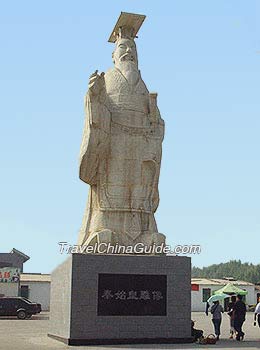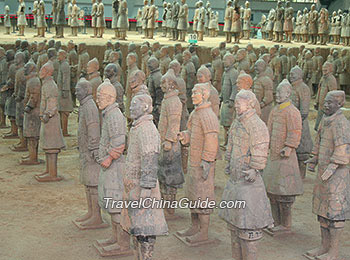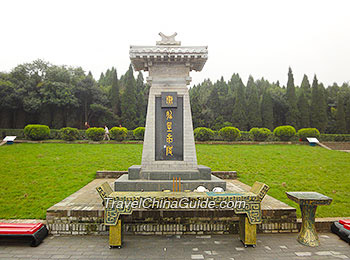Emperor Qin Shi Huang – First Emperor of China
 |
| Statue of Qin Shi Huang |
Emperor Qin Shi Huang (259 BC - 210 BC) fascinates people when they talk about the Great Wall and the Terracotta Warriors and Horses - his two greatest achievements. As the first emperor of China, he indeed has a profound influence on Chinese history and culture.
How did he come to the throne?
Qin Shi Huang, born as Ying Zheng in 259 BC, was the son of the king of the Qin State. At the age of thirteen, he succeeded his father's regality. Ying Zheng was very aggressive and ambitious at an early age. He assumed full power at 22 by ridding himself of his premier, Lu Buwei, who acted as regent while he was a minor. He wanted to unify and subjugate all the states like Han, Zhao, Wei, Chu, Yan and Qi by the powerful political, economic and military strength of the Qin State. Ying Zheng realized his ambition and built the first feudal and centralized empire in Chinese history in 221 BC. This was what we called - the Qin Dynasty (221 BC - 206 BC). Ying Zheng was the first emperor of a united China, so he proclaimed himself Qin Shi Huang.
Qin Shi Huang
When Ying Zheng unified China, he considered his achievement surpassing the legendary "San Huang (three emperors)" and "Wu Di (five sovereigns)". He created a new title for himself: "Huangdi" together with "Shi (means the first)", hence get the name "Qin Shi Huang" or "Qin Shi Huangdi", which means he was the first emperor of China. He hoped his descendants would follow in his steps to rule the country for eternity.
Achievements and Defects
 |
| Clay Figure Soldiers in Qinshihuang's Tomb |
In order to consolidate the nascent empire, Qin Shi Huang reformed politics, economy and culture. In politics, he abolished the hereditary vassal enfeoffment system and established prefectures and counties, ruled directly by the emperor. Based on the original rules of the Qin State, the emperor adopted some regulations of other rival states to form a workable law of the Qin Dynasty. In economy, he claimed that both the agriculture and commerce were very important. People should have them developed together. Besides, tax system began to function and coinage and metrology were all standardized. In culture, the emperor unified the Chinese characters in writing, which promoted the development of culture. However, he also suppressed scholars who were not to his liking. Consequently, many scholars involved were killed in Xianyang.
The symbol of the Chinese ancient civilization, the Great Wall bears witness to Qin Shi Huang's centralism. He ordered conscript laborers to link together the defensive works against marauding nomads already built by the former states. That was the forerunner of the modern Great Wall. Another world-famous achievement is the Terracotta Warriors and Horses in Xi'an, which was discovered nearby the mausoleum of Emperor Qin Shi Huang. Both are the wonders of China. But during their construction, countless conscripts lost their lives. It's really wasting manpower and resources.
Decline of the First Emperor
 |
| Qin Shihuang's Mausoleum |
Qin Shi Huang longed for longevity, so he sent his ministers to go on quests seeking for an elixir of immortality. However, death claimed him before he could find success on that matter. He departed from the world of the living in 210 BC while traveling. The Peasant Uprising led by Chen Sheng and Wu Guang broke out soon after Hu Hai, the second generation, got onto the throne. Accordingly, the Qin Dynasty came to an abrupt end in 206 BC. Qin Shi Huang is truly an epoch-making historic emperor in history.![]() Mystery about Emperor Qin Shi Huang
Mystery about Emperor Qin Shi Huang![]() What did Qin Shi Huang die from?
What did Qin Shi Huang die from?![]() Where was Qin Shi Huang buried?
Where was Qin Shi Huang buried?![]() Why the Emperor Qin Shi Huang did not determine the empress?
Why the Emperor Qin Shi Huang did not determine the empress?![]() Qin Shi Huang Facts: 10 Things to Know about the First Emperor of China
Qin Shi Huang Facts: 10 Things to Know about the First Emperor of China![]() Two Sons of Emperor Qin Shi Huang
Two Sons of Emperor Qin Shi Huang![]() Fu Su
Fu Su ![]() Hu Hai
Hu Hai
In year 7 too and I found it so helpful!